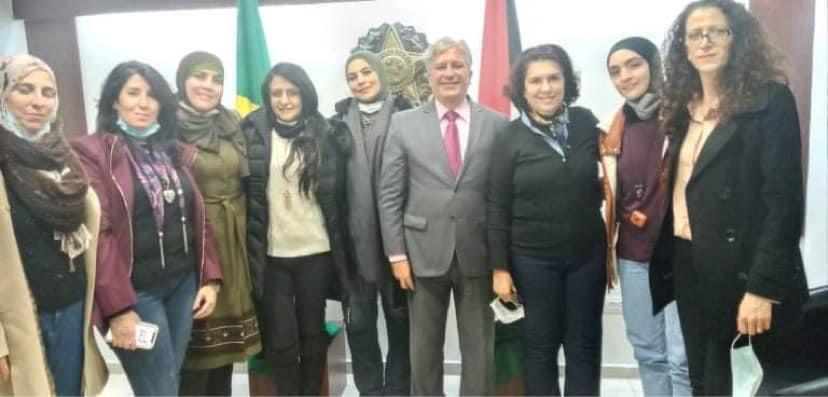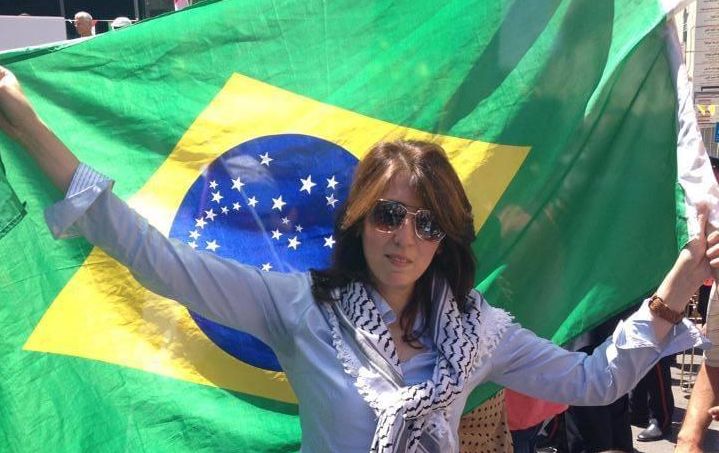São Paulo – Seven women are responsible for liaising between the Brazilian community and Brazil’s diplomatic representation in Ramallah, Palestine. They are the members of the Brazilian Citizens Council, an initiative of Brazil’s Ministry of Foreign Affairs to help connect government and the citizens who live abroad, and to plan out actions targeting these communities.
Council lineups change every two years. Its latest iteration in Palestine is female-only, featuring president Fátima Hamayel (pictured above), vice president Najat Hamad, spokeswoman Huda Hamida, secretary Miriam Assaf, and members Jamila Abed, Líbia Shalabi, and Yasmin Shalabi. Eligibility requirements include being Brazilian, speaking Portuguese, and living in Palestine.
Hamayel explains that the all-female lineup came naturally. The Council has had male members in the past, and the president believes this is not the case at this time due to schedule constraints. The members are volunteers. Despite the biannual lineup changes, Hamayel argues that new members can join in any time, and that the group is open to men.
In the meantime, however, the members enjoy the positive aspects of being in a women-only group. According to Hamayel, all members are friends and companions, and are very comfortable doing the work. They meet at cafés and restaurants, and they feel a familial bond to one another. “Our relationship is beautiful, and that is great to our work, which is all about being a team,” she says.
Would-be members are invited to apply via the Council’s social media. The Council is supported by the local chapter of Brazilian diplomacy. Brazil has a diplomatic office in Ramallah, Palestine, which has been under ambassador Alessandro Candeas since last December.
Here’s more on this topic: Ambassador wants to diversify Brazil-Palestine relations
Hamayel explains that the Council works as a channel for communication between the diplomatic office and the Brazilian community. The Covid-19 pandemic has restricted face-to-face meetings, but the group used to personally relay information at villages where Brazilians reside. It also used to sponsor activities designed to keep the community together and help keep Brazilian language and culture alive.
Activities included football practice sessions in which Brazilian Portuguese was spoken; Brazilian Portuguese language courses; and celebrations on dates such as Children’s Day and Festa Junina, invariably accompanied by Brazilian music and cuisine. The Council also represents Brazil at fairs across the country, its president says. Hamayel has been helping out with the Council’s work since its first lineup ever, in 2014.
Keeping the culture alive
Keeping Brazilian culture alive is one of the goals of the Council, since most of the community has been in the Arab country since the Palestinian National Authority (ANP) was established, about 30 years ago. “I, for one, had never realized that I should teach Portuguese to my children,” says Hamayel. She moved to Palestine as a twenty-something in 1994. She married a local and had two children.
According to the Council’s president, the Ramallah area is home to the most Brazilians in Palestine. Most men are tradesmen, and had been since back in Brazil, and most women are housewives, although many run small Brazilian pastry or handicraft businesses or work in trade. One of the Council members is a party decorator and a DJ.
Fátima Hamayel holds a degree in Biological Sciences and works as executive director for a pro-women NGO. She claims that one of the Council’s jobs will be to foster entrepreneurism among Brazilian women in Palestine, including for export. To this end, the group will get backing from the diplomatic office in Ramallah, which Hamayel says is a great supporter. The office enabled online help from psychologists in Brazil.

The president notes that most Brazilians who moved to Palestine following the inception of the PNA dreamed of a free, independent state. “Unfortunately, that still isn’t the case,” she says. Some were Palestinians who longed to go back home. According to Hamayel, the Israeli occupation makes it very difficult for Palestinian residents to move across the country or even travel to Brazil.
But she keeps herself focused on what brought her to Palestine in the first place. “I like the life I live here. I chose to come, I believe this is a holy land, that this is ‘the’ Holy Land, and I believe in peace. I believe everything will get better one day, and I believe that ours is a just cause.” Hamayel also said she has adapted well in Palestine, and that Ramallah is a beautiful, modern city whose residents want for nothing.
Translated by Gabriel Pomerancblum




